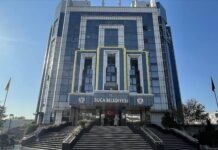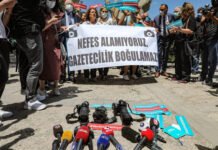Jamal Khashoggi’s Turkish fiancée, Hatice Cengiz, said in an interview broadcast live on Habertürk on Thursday that the slain Saudi journalist was experiencing “great loneliness” due to Riyadh’s jailing of his friends,
“He thought Turkey was a safe country and that if he were to be held or interrogated, the issue would be quickly resolved,” she said.
“He had applied for US citizenship but it had not yet been granted. He was a Saudi citizen. He was experiencing great loneliness. Perhaps it was this loneliness that pushed him into the emotional relationship we had soon after we met,” Cengiz said, according to a report by the Hürriyet Daily News.
Khashoggi, a Washington Post columnist and a US resident, disappeared on Oct. 2 after a visit to the Saudi consulate in İstanbul to retrieve documents for his upcoming marriage. Cengiz was the first person to sound the alarm after his disappearance. After weeks of denial, Saudi Arabia admitted on Thursday that the journalist was the victim of a premeditated killing in the consulate building, although the location of his body is unknown.
During the earlier days of the investigation, Saudi media outlets had quoted Khashoggi’s son from a former marriage as saying that the family in Riyadh had not known about the existence of the Turkish fiancée.
“I don’t have much information about his family in Saudi Arabia. He told me his former marriage ended for political reasons. He was lonely and sad. He was complaining that he didn’t know what had happened to his friends in Saudi Arabia,” Cengiz said.
Saudi Arabia’s Crown Prince Mohammed bin Salman, who is widely suspected to have been involved in Khashoggi’s killing, is criticized for jailing hundreds of critics.
Khashoggi’s eldest son Salah was given permission to leave Saudi Arabia following a months-long travel ban after he met with Prince Mohammed during a condolence visit in Riyadh on Wednesday.
“I don’t know whether it is correct to describe Jamal as a Saudi dissident. There is a process of transformation going on in his country now. He was telling me that it was now his responsibility to write columns because his friends in Saudi jails are not allowed to write,” she added.
Cengiz also clarified two issues about Khashoggi’s final appointment at the consulate that were widely reported in what she described as erroneous. It was earlier reported that Khashoggi had previously applied to get the documents from the Saudi Embassy in Washington, D.C., but was sent by them to İstanbul. “I have no knowledge about such a request. People talk about it, but Khashoggi would have told me if it had happened,” Cengiz said.
It was also widely reported that Khashoggi had told Cengiz to call Turkish President Recep Tayyip Erdoğan’s advisor Yasin Aktay if he didn’t exit the consulate after a certain period of time on Oct. 2.
Cengiz explained that Khashoggi had told her to call Aktay when he felt poorly and had gone to a hospital during a previous visit to Turkey. “When he entered the consulate on Oct. 2, he did not tell me this because he was very relaxed as the consulate staff had treated him very well four days earlier. After he failed to leave the building, I remembered his earlier advice to call Aktay in the event of an emergency,” she said.
Cengiz also said she did not accept an invitation from US President Donald Trump, the kingdom’s staunchest Western champion, to visit the White House after Khashoggi’s murder because she thought it was aimed at influencing public opinion in his own favor.
“Trump invited me to the United States, but I perceived it as an attempt to curry favor with the public,” Cengiz told Habertürk, pausing at times during the interview and more than once breaking down in tears.
Trump and Prince Mohammed have cultivated warm ties, although the US president said earlier this week that the crown prince, as the kingdom’s de facto ruler, bore ultimate responsibility for the operation against Khashoggi. Trump also said Riyadh had staged the “worst cover-up ever” over the killing.
CIA Director Gina Haspel heard an audio recording of the incident in the consulate during a visit to Turkey this week, sources told Reuters, and has briefed Trump on Turkey’s findings and her discussions with Turkish officials.
Cengiz said Khashoggi was concerned tensions would escalate when he visited the consulate the first time on Sept. 28, but he was treated well during that visit, which appeared to reassure him, she said.
She went on to note that they first went to the Saudi Consulate General on Sept. 28. Cengiz said both of them were nervous, fearing a possible interrogation. However, contrary to their fears, Khashoggi left the diplomatic building happy as the consulate employees were nice to him, according to Cengiz.
Before their second visit to the consulate on Oct. 2, she noted that Khashoggi told her to go to school and that he would go to the consulate alone. “Although he said he would go alone, I had this feeling that I shouldn’t let him do that,” she said, adding that he was encouraged by the first visit to the consulate.
She said she was at first irritated since Khashoggi hadn’t left the building and then frightened after learning that the work hours of the consulate were over. “Then, a Turkish official told me everyone had left the building and that there was no one inside,” she said, adding that she felt the greatest fear of losing him at that time.
Cengiz said she handed Khashoggi’s computer, phones and private belongings over to the prosecutor three or four days after the incident. “The situation has political, judicial and humanitarian aspects,” she said.
Meanwhile, Turkish prosecutors have prepared an extradition request for 18 suspects from Saudi Arabia in the killing of Khashoggi, authorities said on Friday, after Turkish President Recep Tayyip Erdoğan urged Riyadh to disclose who ordered the murder.
Erdoğan has in recent days stepped up pressure on Saudi Arabia to come clean in the case, and Western governments have also voiced increasing skepticism, pitching the world’s top oil exporter and a pivotal Middle East ally into a worsening crisis. Erdoğan also said Turkey had more information than it had shared so far about the killing of Khashoggi.
Saudi Arabia’s public prosecutor on Thursday said the killing of Khashoggi was premeditated, contradicting a previous official statement that it happened accidentally during a fistfight in the consulate. Riyadh’s numerous shifting accounts of the killing have undermined Prince Mohammed’s stance in the West.
Turkish prosecutors seeking the extraditions accuse the 18 of “murder by premeditation, evil intent or by torture.” Riyadh had previously arrested the 18 as part of its investigation into the case, including a 15-man security team that Turkey says flew in hours before the killing and carried it out.
“Who gave this order?” Erdoğan said in a speech to members of his Justice and Development Party (AKP) in Ankara. “Who gave the order for 15 people to come to Turkey?” he said.
Saudi officials initially denied having anything to do with Khashoggi’s disappearance after he entered the consulate.
“The reasoning behind the extradition request is that Jamal Khashoggi was murdered in Turkey by Saudi nationals who traveled to Turkey for that specific purpose,” a senior Turkish official said. “It is clear that the judicial system in Turkey is better equipped to genuinely serve the cause of justice in this case.”
Saudi Arabia has also sacked five senior government officials as part of the investigation.
Turkey is ranked 157th among 180 countries in the 2018 World Press Freedom Index released by Reporters Without Borders (RSF). If Turkey falls two more places, it will make it to the list of countries on the blacklist, which have the poorest record in press freedom.
Turkey is the biggest jailer of journalists in the world. The most recent figures documented by SCF show that 237 journalists and media workers were in jail as of October 7, 2018, most in pretrial detention. Of those in prison 169 were under arrest pending trial while only 68 journalists have been convicted and are serving their time. Detention warrants are outstanding for 148 journalists who are living in exile or remain at large in Turkey.
Detaining tens of thousands of people over alleged links to the Gülen movement, the government also closed down some 200 media outlets, including Kurdish news agencies and newspapers, after a coup attempt in Turkey on July 15, 2016.















